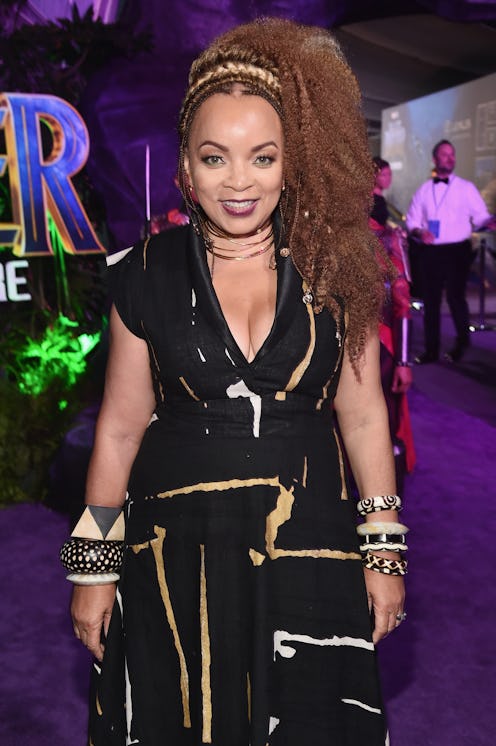Entertainment
'Black Panther's Costume Designer Says Hollywood Women Are Becoming Their Own Dora Milaje

Black Panther's Oscar-nominated costume designer Ruth E. Carter has been working in Hollywood for three decades. She's collaborated with groundbreaking filmmakers like Ava DuVernay on her 2014 breakthrough film, Selma, and Gina Prince-Bythewood on her 2000 feature debut, Love & Basketball. Last year, with Black Panther, Carter helped create costumes for female warriors the likes of which superhero movies have never seen. And the designer tells Bustle that these days, she's glad to see real women band together in Hollywood just like they did in Black Panther.
"I feel like I see more women using their voice," Carter says, speaking over the phone. "We're actually [becoming] our own Dora Milaje, in a way.. we can empower each other, we can support each other." In Black Panther, the Dora Milaje are an all-female fighting force who are Wakanda's first line of defense. They move as a group, always in sync with one another, and when they fight, they do so with pride. They don't speak much, but when they do, it's with purpose and with meaning — and that's what reminds Carter of women in Hollywood in the wake of the #MeToo movement. Just as the Dora find power in their sisterhood, the designer says, so too are the women speaking out about harassment and inequality and making powerful moves in the industry.
"Black Panther having that female fighting force is timely in that I think the women in Hollywood feel like they can step into their rightful place and be warriors, and not suffer any consequences," says Carter. "We're directing, we're producing, we're writing... We're being decorated for things that are not just beauty awards."
Over the years, the designer has seen the ups and down of various waves of inclusion in Hollywood. She's seen a rise of women in the industry overall, but also the painful stagnation of female representation on screen. She was there when Selma earned an Oscar nomination for Best Picture in 2015, but not a Best Director nod for DuVernay. She watched Halle Berry became the first black woman to win the Best Actress Oscar in 2002, yet has since seen white women pick up the award every year since. But, when it comes to the current momentum of Time's Up, #MeToo, and the "Dora Milaje" of Hollywood women, Carter is finally seeing change that she believes will last.
Still, while she's thrilled to see so many women standing up for themselves — and male allies men supporting them — she reveals that feeling confident in her own career took some time. In fact, Carter admits that she didn't really feel like she'd "made it" until she received her first Oscar nomination in 1993 for her work on Malcolm X. And even now, with three Oscar nods under her belt, she experiences moments of second-guessing herself. "I think every artists has doubts about their projects," she says. "But I think those doubts are healthy. I think that we use those doubts to make us take a deeper dive into our own process."
For proof, look no further than Carter's 2018 masterpiece: the costumes of Black Panther. Even with decades in the industry, the designer admits that she was a little nervous to step into the big-budget Marvel Cinematic Universe for the first time. "Walking into Marvel Studios can be intimidating if you don't know a lot about [visual] effects and special effects," she explains. However, while she might have been a bit intimidated by the new opportunity, she didn't question her own skills. Says Carter, "The doubt was not within myself as a costume designer, maybe there were doubts about what it is that I was facing. ... Who is the Black Panther and how do I learn more about Wakanda?"
It's safe to say that she figured it out. The costumes of Black Panther are full of stunning, intricate details, from the smooth design of the Black Panther suit to the beaded armor of the Dora Milaje. And it's all rooted in the African tribes from which Carter got her inspiration. "There's so many different areas around Africa where you can look at this beauty, this artistry... it's like a feast," she says, noting beading inspired by the Turkana tribes of Kenya in particular.
It's this care and thoughtfulness that no doubt earned Carter her most recent Oscar nomination for Best Costume Design. And it could very well win her the golden statue when the awards are announced on Sunday, Feb. 24. But, whatever happens to Carter on Oscar night, she will surely go through it with the newly re-invigorated army of women in Hollywood standing beside her.